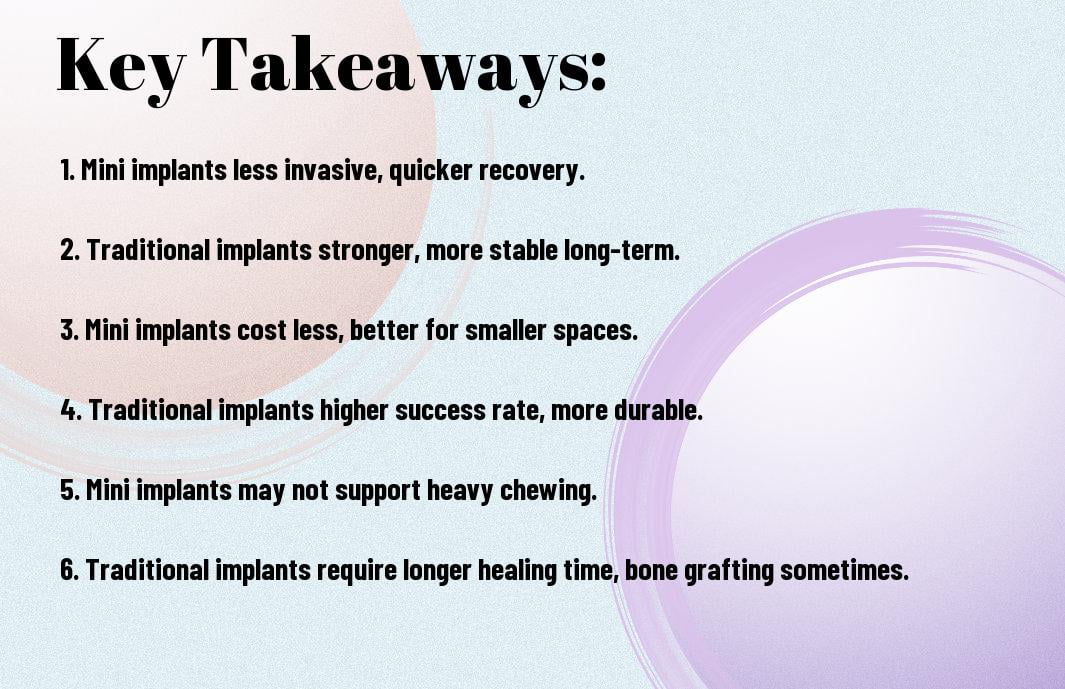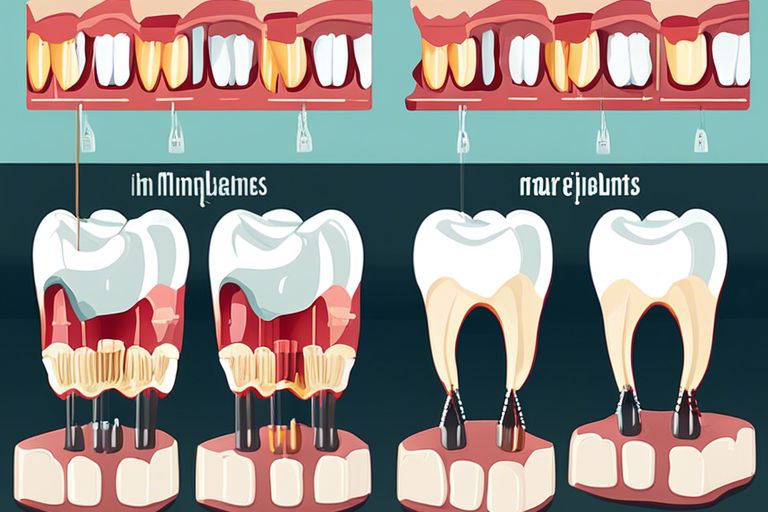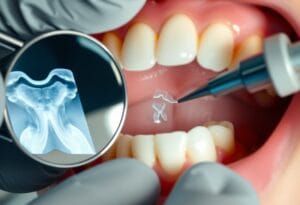Most individuals seeking dental implants are faced with the decision of choosing between mini dental implants and traditional implants. While both methods serve the purpose of replacing missing teeth, there are significant differences in their procedures, benefits, and drawbacks. In this comprehensive guide, we will explore the pros and cons of mini dental implants versus traditional implants, highlighting the key factors that can help you make an informed decision about the most suitable option for your oral health needs.
Key Takeaways:
- Mini Dental Implants: More affordable option compared to traditional implants.
- Traditional Implants: Better stability and strength for long-term use.
- Both types: Can improve appearance, chewing ability, and overall dental health.

Understanding Dental Implants
Definition and Purpose of Dental Implants
To understand dental implants, it’s important to know that they are artificial tooth roots that are surgically placed into the jawbone. The primary purpose of dental implants is to provide a stable foundation for replacement teeth. Whether you need to replace a single tooth or several teeth, dental implants can offer a long-term solution that looks, feels, and functions like natural teeth. This innovative dental procedure can significantly improve your oral health and restore your smile.
Brief History of Dental Implantology
Dental implantology dates back to ancient times when civilizations attempted to replace missing teeth with various materials such as shells and metals. However, modern dental implants as we know them today have roots in the early 20th century when researchers discovered the biocompatibility of titanium. This led to the development of the first successful titanium dental implant in the 1950s. Since then, advances in technology and dental procedures have made dental implants a reliable and widely used tooth replacement option.
Mini Dental Implants
What Are Mini Dental Implants?
It is vital to understand that mini dental implants are smaller in diameter compared to traditional dental implants. These implants are typically used to stabilize lower dentures, support single-tooth replacements, or assist in securing upper dentures in patients with insufficient bone structure for regular implants. They are a minimally invasive solution with a shorter recovery time, making them a convenient option for many patients.
Advantages of Mini Dental Implants
Mini dental implants offer several advantages over traditional implants. They are less invasive, require less healing time, and can often be placed in a single visit. Mini implants are also more affordable, making them an attractive option for patients on a budget. Additionally, these implants can help prevent bone loss in the jaw and provide stability and support for dentures or bridges.
Mini dental implants can be a game-changer for patients who are looking for a quick and effective solution to their dental problems. They can improve the overall quality of life by restoring the ability to eat, speak, and smile confidently. With proper care and maintenance, mini dental implants can last for many years, providing a long-term solution for missing teeth.
Limitations and Drawbacks of Mini Dental Implants
Implants While mini dental implants have many advantages, it is also vital to consider their limitations and drawbacks. One of the main limitations is that mini implants may not be suitable for patients with significant bone loss or those who require implants to support multiple teeth. Additionally, mini implants may not be as strong or durable as traditional implants, making them more prone to fractures or wear over time.
Understanding the limitations and drawbacks of mini dental implants is crucial for making an informed decision about your dental treatment. While they offer many benefits, it is important to consult with your dentist to determine if mini implants are the right choice for your specific needs.

Traditional Dental Implants
What Are Traditional Dental Implants?
Dental implants are artificial tooth roots that are surgically positioned into the jawbone beneath your gums. These implants allow your dentist to mount replacement teeth onto them, providing a stable foundation for artificial teeth, such as crowns, bridges, or dentures.
Advantages of Traditional Dental Implants
With traditional dental implants, you can enjoy a permanent solution for missing teeth that looks and feels natural. They are incredibly durable and can last a lifetime with proper care. Traditional implants also help prevent bone loss in the jaw and maintain the overall structure of your face.
Limitations and Drawbacks of Traditional Dental Implants
While traditional dental implants offer numerous benefits, there are some limitations to consider. The process of getting traditional implants can be lengthy, requiring multiple surgeries and a few months for the implant to integrate with the jawbone. Additionally, some patients may not be suitable candidates for traditional implants due to insufficient bone density or other medical conditions.
Comparative Analysis: Mini Implants vs. Traditional Implants
Indications for Use
The Mini Implants are typically used for patients who have minimal bone mass or density, making them unsuitable candidates for traditional implants. On the other hand, Traditional Implants are usually recommended for patients with sufficient jawbone structure to support the implant.
Comparison of Procedure and Recovery Time
The Mini Implants require less invasive surgery and have a shorter recovery period compared to Traditional Implants. While traditional implants may involve more extensive surgery and longer healing times, they often provide a sturdier foundation for prosthetic teeth.
Mini Implants vs Traditional Implants – Detailed Comparison
| Mini Implants | Traditional Implants |
| Less invasive procedure | More extensive surgery |
| Shorter recovery time | Longer healing times |
Longevity and Success Rates
Mini Implants have shown high success rates and can last for many years with proper care. They are a reliable option for supporting dentures and crowns. Conversely, Traditional Implants are known for their durability and longevity, often lasting a lifetime when properly maintained.
Analysis
| Mini Implants | Traditional Implants |
| High success rates | Durable and long-lasting |
| Reliable for supporting dentures | Potential lifetime solution |
Cost Comparison
Comparative Analysis of Mini and Traditional Implants’ Cost
| Mini Implants | Traditional Implants |
| Lower initial cost | Higher initial cost |
| Less expensive overall | Potentially higher long-term costs |
Plus, while mini implants offer a less invasive procedure and shorter recovery time, traditional implants are known for their durability and potential lifetime solution, albeit with higher initial costs. Both options have high success rates, making them reliable choices for patients seeking dental implant treatments.
To wrap up
As a reminder, when considering mini dental implants vs. traditional implants, it’s crucial to weigh the pros and cons of each option. Mini implants offer a less invasive procedure, quicker recovery time, and cost-effectiveness, while traditional implants provide more stability and durability. Ultimately, the choice between the two types of implants should be based on the individual’s specific dental needs and preferences, so consulting with a dental professional is important to make an informed decision for long-term oral health.
FAQ
Q: What are mini dental implants?
A: Mini dental implants are smaller in diameter compared to traditional implants and are often used to stabilize lower dentures or in cases where there is minimal bone structure. They are a less invasive option than traditional implants and can often be placed in a single visit.
Q: How do traditional implants differ from mini dental implants?
A: Traditional implants are larger in diameter and are typically used to replace individual teeth or to support bridges and dentures. They require a longer healing time as they integrate with the jawbone before the final restoration can be placed. Traditional implants offer a more stable and long-term solution for missing teeth.
Q: What are the pros and cons of mini dental implants versus traditional implants?
Pros of Mini Dental Implants:
- Less invasive procedure
- Can often be placed in a single visit
- Lower cost compared to traditional implants
- Used in cases of minimal bone structure
Cons of Mini Dental Implants:
- May not be as stable as traditional implants
- Smaller size may not be suitable for all restoration options
- Not ideal for replacing individual teeth
Pros of Traditional Implants:
- Provide a more stable and long-term solution
- Suitable for replacing individual teeth or supporting bridges and dentures
- Integration with the jawbone for added strength
Cons of Traditional Implants:
- More invasive surgical procedure
- Longer healing time before final restoration can be placed
- Higher cost compared to mini dental implants





